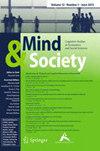The Role of Emotional Regulation in Mental Well-being of Indian Adolescents
Q1 Arts and Humanities
引用次数: 0
Abstract
Adolescence is an important transitional period of life marked with curiosity and experimentation with risky behaviours and experience of emotional changes which may pose threat to their mental well-being. Hence, it becomes increasingly important for adolescents to develop positive emotion regulation (ER) strategies, which promotes mental well-being in youth. The objectives of the present study were to investigate the relationship between emotional regulation and mental well-being among Indian adolescents and to explore the areas of difficulties in the emotion regulation. The study used a correlational design. A total sample of 296 adolescents (174 males and 122 female; age range 12–15 years) were recruited from a private school in Delhi NCR through purposive sampling and administered the scales of Difficulty in Emotion Regulation (DERS-18) and Mental Health Continuum-Short Form (MHC-SF).The obtained quantitative data were analysed using descriptive statistics and Pearson’s correlation. A significant negative relationship between the variables, viz. difficulties in emotion regulation and mental health and well-being was found. The implications and limitations of the study are discussed.情绪调节在印度青少年心理健康中的作用
青春期是人生的一个重要过渡时期,这一时期的特点是对危险行为充满好奇和尝试,并经历可能对其心理健康构成威胁的情绪变化。因此,青少年发展积极的情绪调节(ER)策略以促进其心理健康变得越来越重要。本研究的目的是调查印度青少年情绪调节与心理健康之间的关系,并探索情绪调节中的困难领域。研究采用了相关设计。通过有目的的抽样,从德里新德里地区的一所私立学校招募了 296 名青少年样本(男 174 人,女 122 人;年龄在 12-15 岁之间),并对他们进行了情绪调节困难量表(DERS-18)和心理健康连续简表(MHC-SF)的测量。研究发现,情绪调节困难与心理健康和幸福感这两个变量之间存在明显的负相关关系。本文讨论了这项研究的意义和局限性。
本文章由计算机程序翻译,如有差异,请以英文原文为准。
求助全文
约1分钟内获得全文
求助全文
来源期刊

Mind and Society
Arts and Humanities-Philosophy
CiteScore
2.30
自引率
0.00%
发文量
5
期刊介绍:
Mind & Society is a journal for ideas, explorations, investigations and discussions on the interaction between the human mind and the societal environments. Scholars from all fields of inquiry who entertain and examine various aspects of these interactions are warmly invited to submit their work. The journal welcomes case studies, theoretical analysis and modeling, data analysis and reports (quantitative and qualitative) that can offer insight into existing frameworks or offer views and reason for the promise of new directions for the study of interaction between the mind and the society. The potential contributors are particularly encouraged to carefully consider the impact of their work on societal functions in private and public sectors, and to dedicate part of their discussion to an explicit clarification of such, existing or potential, implications.Officially cited as: Mind Soc
 求助内容:
求助内容: 应助结果提醒方式:
应助结果提醒方式:


